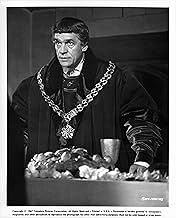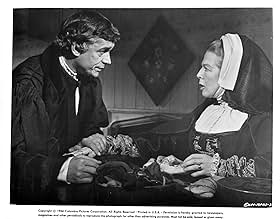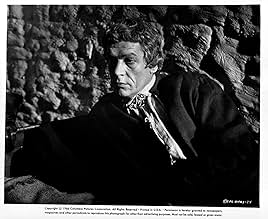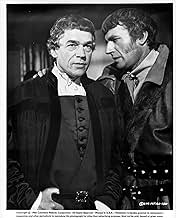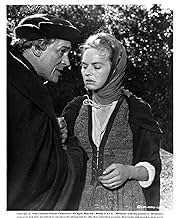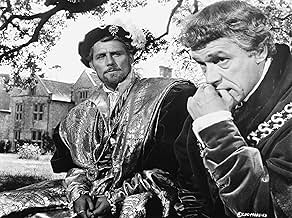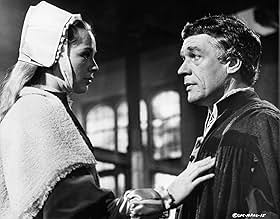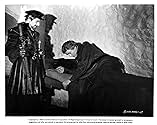Thomas More widersetzt sich Heinrich VIII., Der sich von Katharina von Aragon scheiden lassen will, um seine Geliebte Anne Boleyn zu heiraten.Thomas More widersetzt sich Heinrich VIII., Der sich von Katharina von Aragon scheiden lassen will, um seine Geliebte Anne Boleyn zu heiraten.Thomas More widersetzt sich Heinrich VIII., Der sich von Katharina von Aragon scheiden lassen will, um seine Geliebte Anne Boleyn zu heiraten.
- 6 Oscars gewonnen
- 34 Gewinne & 9 Nominierungen insgesamt
Best Picture Winners by Year
Best Picture Winners by Year
Handlung
WUSSTEST DU SCHON:
- WissenswertesProducer and director Fred Zinnemann, as quoted in his autobiography, calls this the easiest movie he ever made, thanks to the extraordinary caliber of the crew, and the actors and actresses, and the way they worked together.
- PatzerLord Chancellor Wolsey did not die in office; he was removed from the office of Lord Chancellor by Henry (because of his displeasure at Wolsey's failure to secure a divorce from Catherine), and died more than a year after Sir Thomas More became Lord Chancellor. Wolsey did, however, remain Archbishop of York.
- Zitate
William Roper: So, now you give the Devil the benefit of law!
Sir Thomas More: Yes! What would you do? Cut a great road through the law to get after the Devil?
William Roper: Yes, I'd cut down every law in England to do that!
Sir Thomas More: Oh? And when the last law was down, and the Devil turned 'round on you, where would you hide, Roper, the laws all being flat? This country is planted thick with laws, from coast to coast, Man's laws, not God's! And if you cut them down, and you're just the man to do it, do you really think you could stand upright in the winds that would blow then? Yes, I'd give the Devil benefit of law, for my own safety's sake!
- VerbindungenFeatured in Precious Images (1986)
The Tudor dynasty of England was an interesting 120 years or so. This film focuses on the very brief time that Henry VIII was fighting the Roman Catholic Church over him marrying a second wife after the same church had made a special dispensation for him to marry the first, with that first wife now past the age of childbearing and no surviving son resulting from the marriage.
Into the fray comes Sir Thomas More, a devout Catholic. This film distills More's viewpoints down to his refusal to recognize that Henry has any right to break off from Rome and declare himself supreme head of the church in England. More seemed willing to help with arguments made to Rome in favor of granting Henry a divorce from his first wife, Katharine of Aragon, but he would not go past that into the taking of church property as Woolsey suggested or into the complete break from Rome that Henry eventually made. More was willing to help Henry as far as "working within the system", but he believed that system - the Roman Catholic Church - was established by God and he would not support an alternative view.
More remained silent on the issue of what Henry was doing, thinking this would protect him. He even remains silent to the viewer, since he refuses to share his opinion with anyone, though one can surmise it from what he has said he will not do or swear to and the resignation of his office of chancellor.
The real irony is everybody wondering at More's caution proclaiming - "This isn't Spain, it's England!", with everyone being so sure of their civil liberties there. Yet Thomas Cromwell was executed by Henry in 1540 for pretty much facilitating his marriage to an unattractive woman (Anne of Cleves), Anne Boleyn was executed on trumped up charges of adultery because she too failed to produce a male heir and a second divorce would have just been embarrassing, and the Duke of Norfolk only escaped execution because Henry died the night before Norfolk's scheduled execution. So it turned out that in Tudor England, dying in bed could be a goal difficult to attain in spite of it not being Spain.
In the end, More was executed because of the lies of RIchard Rich, as depicted in the film. More had this guy's number from the beginning. Before his fall from grace, More had urged Rich to take a teaching job and not press his luck at court because of his weakness of character and thus his susceptibility to being bribed and tempted. And yet it was the morally weak and treacherous Rich who eventually ascended to the office of chancellor, lived past the age of 70, and died in bed of natural causes.
The strength of this film lies in its performances - Scofield's steadfastly loyal and honest Thomas More, Robert Shaw as the bombastic and big as life Henry VIII, Susannah York as More's well educated and wise daughter, and especially an almost unrecognizable John Hurt as the slimy little weasel Richard Rich. My apology to weasels everywhere.
It is intensely political and philosophical and really appeals to people who think about standing up for one's ideals even when it is very easy to allow ethics to be bent.
Top-Auswahl
Details
- Erscheinungsdatum
- Herkunftsland
- Sprachen
- Auch bekannt als
- A Man for All Seasons
- Drehorte
- Produktionsfirma
- Weitere beteiligte Unternehmen bei IMDbPro anzeigen
Box Office
- Budget
- 2.000.000 $ (geschätzt)
- Weltweiter Bruttoertrag
- 756 $
- Laufzeit2 Stunden
- Farbe
- Seitenverhältnis
- 1.66 : 1
Zu dieser Seite beitragen







